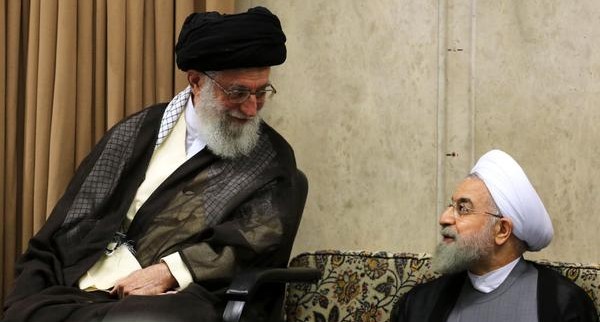PHOTO: Supreme Leader with President Rouhani on Tuesday
LATEST
A week before the deadline for a comprehensive nuclear deal, Supreme Leader has restated Iran’s “red lines” in the negotiations with the 5+1 Powers (US, Britain, France, Germany, China, and Russia).
Addressing Government employees on Tuesday, Ayatollah Khamenei emphasized four conditions:
*“We will not accept a long-term limitation [on uranium enrichment] of 10-12 years and we have told them a smaller amount of years would be acceptable”;
*No limitations on “research, development, and construction [of nuclear facilities]”;
*Removal of UN and US economic sanctions “immediately after the signing of the agreement”, with other general sanctions removed after a “reasonable time”;
*No inspections of military sites, interviews with “Iranian individuals” [nuclear scientists], or “unconventional” inspections.
We are seeking a good deal, as Americans do. But by good deal we mean a fair deal while they mean a totalitarian agreement. #IranTalks
— Khamenei.ir (@khamenei_ir) June 23, 2015
Political deputies from Iran and the 5+1 are in the eighth round of talks in Vienna since the announcement of a nuclear framework on April 2. Foreign Ministers are expected to join the talks at the end of the week.
Khamenei portrayed the process, dating back years, as one of the US appealing to Iran for negotiations:
The topic…is related to the previous [US] administration and is related to the sending of middlemen to Tehran to request talks.
At that time, one man came to me….The Americans had told this middle man we want to recognize Iran as a nuclear power and solve the nuclear issue and lift all sanctions in the span of six months. Of course I told this middle man that I do not trust Americans and their words but [with the US Administration] sending this man, I decided to test this problem one more time and the negotiations began.
However, he warned that the US continued to be deceptive:
In the course of the negotiations, the Americans had changed the six months which had been promised for the removal of sanctions to one year; the Americans extended the talks and even threatened to add even more sanctions….
Reading the demands of the Americans shows that their goal is the complete upheaval of Iran’s nuclear industry, the destruction of the nuclear goals of the country, and changing Iran’s nuclear program into a meaningless picture….
If the Americans are able to achieve their goals, they will have achieved a great victory because they have made the freedom-loving nation of Iran surrender and they will have defeated a country that could have other a model for other countries.
The Supreme Leader again promoted his “resistance economy”, first declared as a goal in 2012, as a necessity for Iran amid the US pressure and duplicity:
Now the resistance economy is entering into the mainstream economic literature and culture of the country….
I categorically say that in the country’s current situation and considering existing capacities, the implementation of the resistance economy model in the country’s current situation is completely possible.
We are serious in efforts for lifting sanction, yet see them an opportunity. Sanctions made us reconsider & rely on our domestic power.
— Khamenei.ir (@khamenei_ir) June 23, 2015
Meanwhile, The New Yorker has carried a quote of warning from Foreign Minister Mohammad Javad Zarif about the possible failure of the “unholy exercise” of the talks:
It won’t be the end of the world. The US will have lost a major opportunity, probably unique. But, for us, our population is accustomed to making necessary sacrifices to preserve its dignity and its rights.
It is unclear when Zarif made the statement to journalist Robin Wright.
Guardian Council Approves Parliament Bill Setting Conditions on Nuclear Deal
The Guardian Council has approved a Parliamentary bill that sets conditions on any nuclear deal between Iran and the 5+1 Powers.
The bill for “safeguarding nuclear achievements” was passed Tuesday by 213-10, with 6 abstentions. It requires sanctions to be lifted “on the very day when [the agreement] will take effect” and ban inspections of military sites and questioning of nuclear scientists.
See Iran Daily, June 21: Parliament Advances Bill Putting Conditions on Nuclear Agreement
However, the MPs effectively acknowledged that their demands were symbolic by restating that authority over the nuclear agreement remained with the Supreme National Security Council.
Despite the concession, senior Presidential advisor Mohammad-Baqer Nobakht said parts of the bill violated the Iranian Constitution: “According to Article 176, the issue of nuclear negotiations is to be decided by the Supreme National Security Council (SNSC), not by the administrative or legislative bodies of the government.”

